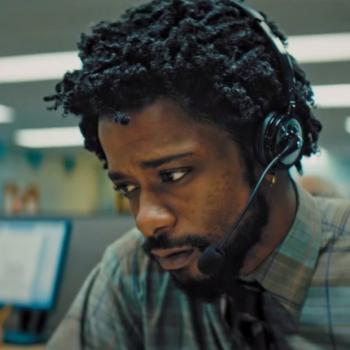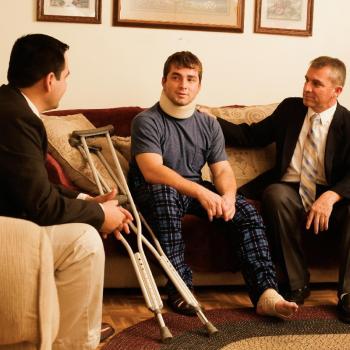I recently watched a preview for The Fifth Estate, the new film about WikiLeaks co-founder Julian Assange. At one point in the trailer, which seems to me to lean toward an image of a crusader for democracy and free speech, Benedict Cumberbatch earnestly portrays Assange as telling a hushed crowd, “Man is least himself when he talks in his own person. But if you give him a mask, he WILL tell you the truth.”
I don’t buy it.
Much as I have studied, discussed, and analyzed the questions surrounding anonymity on the internet no one (including me) has yet been able to convince me that the benefits of anonymity on the web outweigh the costs. Let me give you a few of my reasons:
1. Under the cloak of anonymity, people will say horrible, horrible things.
Those of us who write – or read – on the internet know that reading the comments is a surefire way to encounter nasty and often pointless ugliness, where people will spout sexist, racist, and generally intolerant abuse from behind the mask of their online avatars. The most obvious recent case in point is the Cheerios commercial, first aired earlier this summer, in which a little girl with dark skin talks to her white mom about the health benefits of Cheerios. At the end of the ad, we discover (in typically adorable Cheerios-commercial fashion) that the little girl’s father is black. The response to the commercial was so hate-filled that Cheerios disabled the comments.
The media responded in force – people being mean about a cute kid makes good copy – but sadly, I think Gawker said it best: “Cheerios Ad Starring Interracial Family Predictably Summons Bigot Wave.” Because, honestly, are any of us surprised? Post anything that deals with politics, religion, race, or gender on the internet and, if anyone notices, you’re guaranteed an ugly backlash.
2. When you’re trying to engage in a discussion about a sensitive topic, people don’t have to be honest about their motivations. They don’t even have to be honest about who they are.
We all know that businesses have learned the trick of posting good reviews about themselves on popular sites that rate… well… everything. Savvy internet shoppers know that testimonials on a company’s site are virtually worthless in gauging the value of that organization’s product. We’ve also learned to be careful about comments on Amazon and reviews on Yelp, TripAdvisor, and every other consumer feedback site.
What, then, about the discussions we all engage in on blogs, news stories, and other internet forums? People who are strongly committed to a particular opinion can enter the ring anonymously and argue badly in favor of the opposite stance, thus damaging the credibility of the other side. Or, as has more often happened in my experience (that I’ve been aware of, anyway), people in online discussions can, in the interest of appearing unbiased, withhold from their conversational partners some information about their identities that directly influences their perspective. And even if everyone in a particular conversation is acting in good faith, we’re all now conditioned to suspect that those around us in the virtual world might not be – so any interaction is tainted before it gets started.
I’m a humanities scholar. I’m a firm believer in real people sitting face-to-face in actual classrooms where everybody knows everyone else’s name, knowledge base, and interests. Maybe you can do that via Skype (I haven’t tried it), and I know I’ve had very fruitful group conversations via social media with communities of fellow bloggers, for example. But again, in those conversations everyone knows who the other parties are and has a basic understanding of those people’s perspective. (After all – thanks to Google, once you have a name you can find out all sorts of information about a conversation partner.) And knowing that your fellow discussants aren’t hiding their identities builds an element of trust into the conversation that is sorely lacking in anonymous discussions.
3. When it comes to religion, people are emboldened to say and do things from behind their masks that can have very real and very dangerous consequences.
Just this past week, Facebook took down two pages that were dedicated, quite literally, to witch-burning. While it’s easy to dismiss such talk as just that – talk, however ugly – unfortunately in this case the old adage that words can never hurt is demonstrably untrue. At least one of the pages originated with an African Christian fundamentalist pastor. And people are in fact being murdered for the supposed crime of witchcraft in real time in Africa and elsewhere around the world (the previous link also describes a recent rise in witch hunts in both Africa and the United Kingdom).
And what about the seemingly lesser crimes of those who simply slander minorities on the internet or, as in the case of recently unmasked Wikipedia editor Qworty, seek to remove sources of information meant to educate people about such groups? Qworty was a dedicated opponent of paganism on Wikipedia who dismissed pagans as “either charlatans or extremely mentally ill.” Under the guise of his own screen name — and dozens of others created solely for the purpose of editing Wikipedia to suit his personal perspectives – he shut down or edited articles on pagan traditions and pagan thinkers in order to “[get] across the idea that these folks are a whacked-out, highly marginalized minority with extremely dubious beliefs.” Because Qworty not only operated anonymously but also created numerous additional masks that he used to promote his ideas through his edits on Wikipedia, no one noticed for years that there was a single person attacking the people and religions he didn’t like.
I have been researching and teaching minority religions and how Americans portray them in a variety of media for more than a decade. I have explained to dozens of undergraduates that their papers about Mormons or Catholics or Hindus or [insert non-Protestant religion of your choice here] must be rewritten because, although the websites they trusted for information were written in moderate language and cited reputable-looking books and articles, they conveyed inaccurate and often defamatory information. I have explained the dangers of Wikipedia, and particularly its representations of minority groups, to many more. But there are far more people who trust what Google finds them than who don’t.
I have certainly not covered all of the bases in this complex discussion. I’m fully aware that I’ve ignored many strong arguments in favor of protecting anonymity on the internet – but, as I told you at the outset, I’ve weighed the many valid supporting arguments that have been presented to me, and to my mind the cons still outweigh those pros. Anonymity inhibits trust, protects the biased and the ignorant, and breeds trolls. My grandfather, a politician, determinedly drilled me in my childhood that I should never put anything in writing that I wouldn’t want to see on the front page of the newspaper. I think we need to amend that maxim for the 21st century: Don’t put it on the internet if you aren’t willing see it on the front page of WikiLeaks… with your name on it.











